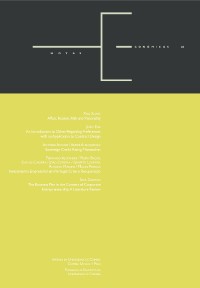Please use this identifier to cite or link to this item:
https://hdl.handle.net/10316.2/44027| DC Field | Value | Language |
|---|---|---|
| dc.contributor.author | Eira, João | - |
| dc.date.accessioned | 2018-07-03T15:05:08Z | |
| dc.date.accessioned | 2020-10-04T14:48:44Z | - |
| dc.date.available | 2018-07-03T15:05:08Z | |
| dc.date.available | 2020-10-04T14:48:44Z | - |
| dc.date.issued | 2018 | - |
| dc.identifier.issn | 2183-203X (PDF) | - |
| dc.identifier.issn | 0872-4733 | - |
| dc.identifier.uri | https://hdl.handle.net/10316.2/44027 | - |
| dc.description.abstract | Economic models of individual behavior often make the assumption that in evaluating between competing alternatives agents are only concerned with how each alternative impacts their own payoffs. This simple, yet reasonable, assumption postulates that agents are self‑regarding, that is, agents are not concerned with how their decisions affect other people. This study casts doubt on this assumption. There has been a steady accumulation of experimental evidence from games such as the ultimatum game and the gift exchange game where the observed behavior is not explained by assuming that agents have self‑regarding preferences. Agents often make decisions that lower their payoffs if by doing so other agents are better off. In contrast to self‑regarding preferences, agents are said in this case to have other‑regarding preferences. Most of the evidence discussed in this study was gathered by the use of laboratory experiments. The issue of external validity of this evidence has long been a point of contention. Lab experiments are highly artificial environments that place strong constraints on individual behavior. While this imbues them with their source of methodological strength, it is also a weakness. Evidence gathered in the lab does not necessarily generalize to the real world, and lab experiments are often compared with field studies which are assumed to provide evidence that is more externally valid. We examine the question of the external validity of lab experiments and conclude they are a valid tool for gathering scientific evidence about human behavior. Inequity aversion is presented as a method of modeling other‑regarding preferences. The model is promptly used to explain the behavior documented in the ultimatum game. An example on how to use other‑regarding preferences to study real world economic interactions is provided in the study of contract design under moral hazard. | eng |
| dc.language.iso | eng | - |
| dc.publisher | Imprensa da Universidade de Coimbra | - |
| dc.rights | open access | - |
| dc.subject | Self‑regarding preferences | eng |
| dc.subject | social preferences | eng |
| dc.subject | ultimatum game | eng |
| dc.subject | contract design | eng |
| dc.title | An introduction to other‑regarding preferences with an application to contract design | por |
| dc.type | article | - |
| uc.publication.collection | Notas Económicas nº 46 | - |
| uc.publication.firstPage | 17 | - |
| uc.publication.issue | 46 | - |
| uc.publication.lastPage | 48 | - |
| uc.publication.location | Coimbra | - |
| uc.publication.journalTitle | Notas Económicas | - |
| dc.identifier.doi | 10.14195/2183-203X_46_2 | - |
| uc.publication.orderno | 2 | - |
| uc.publication.area | Ciências Sociais | - |
| uc.publication.manifest | https://dl.uc.pt/json/iiif/10316.2/44027/266727/manifest?manifest=/json/iiif/10316.2/44027/266727/manifest | - |
| uc.publication.thumbnail | https://dl.uc.pt/retrieve/12118458 | - |
| item.grantfulltext | open | - |
| item.fulltext | With Fulltext | - |
| Appears in Collections: | Notas Económicas | |
Files in This Item:
| File | Description | Size | Format | |
|---|---|---|---|---|
| an_introduction_to_other-regarding_preferences.pdf | 1.3 MB | Adobe PDF |  |
Items in DSpace are protected by copyright, with all rights reserved, unless otherwise indicated.
